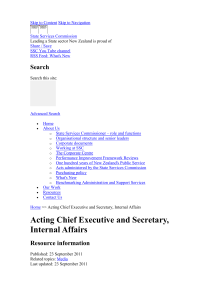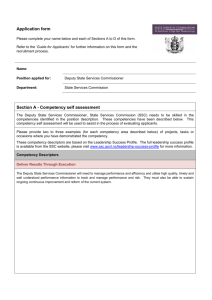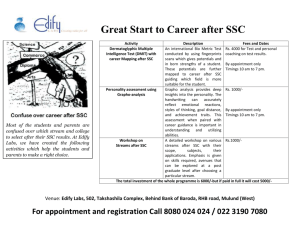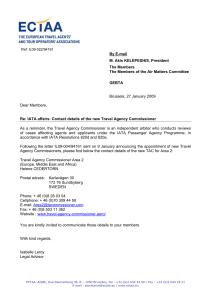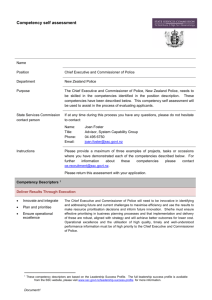The Treasury - State Services Commission
advertisement
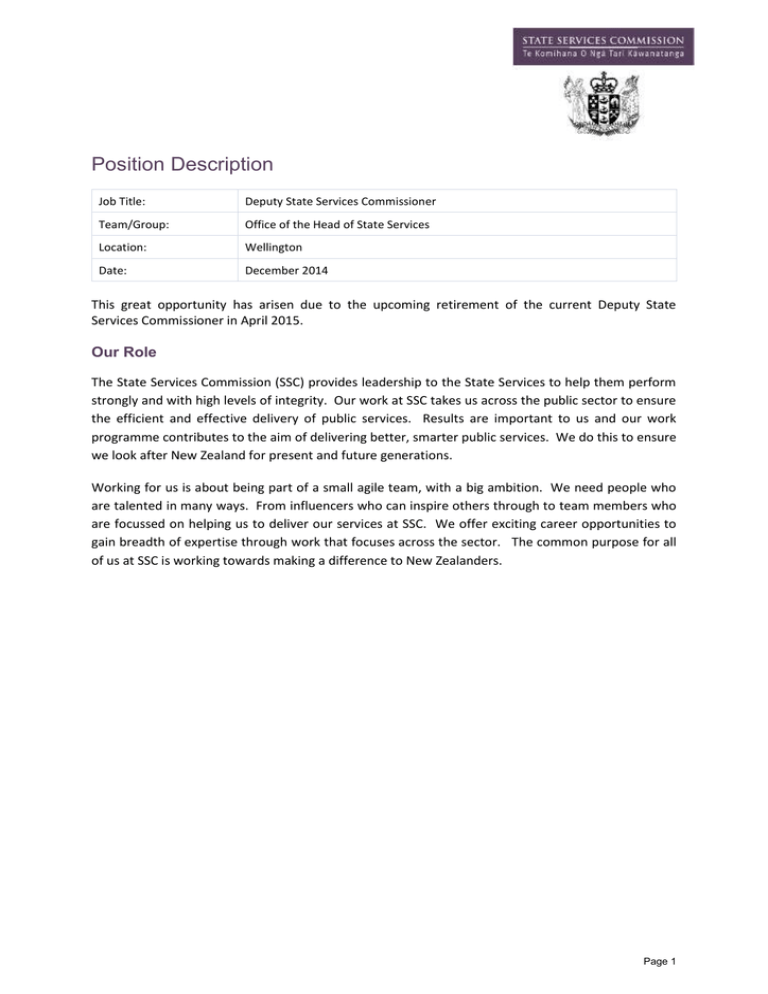
Position Description Job Title: Deputy State Services Commissioner Team/Group: Office of the Head of State Services Location: Wellington Date: December 2014 This great opportunity has arisen due to the upcoming retirement of the current Deputy State Services Commissioner in April 2015. Our Role The State Services Commission (SSC) provides leadership to the State Services to help them perform strongly and with high levels of integrity. Our work at SSC takes us across the public sector to ensure the efficient and effective delivery of public services. Results are important to us and our work programme contributes to the aim of delivering better, smarter public services. We do this to ensure we look after New Zealand for present and future generations. Working for us is about being part of a small agile team, with a big ambition. We need people who are talented in many ways. From influencers who can inspire others through to team members who are focussed on helping us to deliver our services at SSC. We offer exciting career opportunities to gain breadth of expertise through work that focuses across the sector. The common purpose for all of us at SSC is working towards making a difference to New Zealanders. Page 1 Position Purpose There are several leadership aspects to the purpose of the position of Deputy State Services Commissioner. The Deputy Commissioner is a statutory officer appointed by the Governor-General on the recommendation of the Prime Minister. Subject to the control of the Commissioner, the Deputy has and may exercise all the functions, duties, and powers of the Commissioner. These powers and references to the Deputy State Services Commissioner are set out in Part 1 of the State Sector Act 1988 (see Appendix 1). Another important aspect of the role is to provide support to the Commissioner in the exercise of his responsibilities as Chief Executive of the SSC, the Head of State Services, and the employer of public service chief executives, and in this regard the Deputy State Services Commissioner must be able to step in when the Commissioner is unavailable. The Deputy State Services Commissioner also maintains strategic oversight of the Commission’s effectiveness in chief executive recruitment, appointment and performance management and has a key role in ensuring the highest standards of conduct and integrity are upheld by senior leaders across the system. The Commissioner, Deputy State Services Commissioner and the Deputy Commissioner, State Sector Reform work as a team within the Office of the Head of State Services with a broad sharing of responsibilities for the State sector reform agenda and the performance of the system as a whole. The Deputy State Services Commissioner is at the forefront of building and managing effective relationships with chief executives as individuals and as a cohort and, with Ministers across a broad range of issues. As part of the Commission’s senior leadership the Deputy State Services Commissioner plays a critical role in ensuring the Commission fulfills the promise and ambition of its strategic direction by ensuring the right capability is focused on the right priorities and that interconnections between the different parts of the organisation are surfaced, understood and managed appropriately. Position Scope Key Dimensions of Resources Controlled: Financial: $26 million (SSC overall Budget) Direct reports: 6 Key Relationships Public Service chief executives & other leaders Minister of State Services and all other Ministers Central agencies Executive Leadership Team Senior Management Team Commission staff Range of external stakeholders International jurisdictions and contacts Page 2 Key Accountabilities Key Result Areas: Key accountabilities/expectations: System Leadership Executive Management & Development Providing strategic oversight and direction for all chief executive appointments and reappointments. Participating in processes associated with appointing and reappointment of chief executives, inducting new chief executives and managing executive performance. Playing an active role in the individual development of chief executives, succession planning and the development of chief executives as a cohort team. Leading or contributing to fora with chief executives, Ministers and/or other senior leaders and providing advice and support to individual chief executives and Ministers. Contributing to the development of current and future leaders of the Public Service. State Sector Performance & Reform Help drive and embed the shifts in public sector behaviour and performance envisioned by the Better Public Service reforms. Leading and supporting initiatives to support improved State sector performance and reform. Participating with central agency colleagues in governance and other groups progressing the reform agenda and providing context and making connections for chief executives and other leaders within the system. Public Management System Standards and conduct Providing leadership to the State Services to ensure State servants carry out the business of the Government with high ethical standards, shared values and in a spirit of service. Promoting the rights and responsibilities of State servants with departments encouraged and supported to foster a culture of high standards of integrity and conduct. Leading or assisting the Commissioner with responses to requests from the Prime Minister and Ministers to investigate specific issues and the management of their resolution. Undertaking investigations or inquiries through to resolution relating to matters in the public management system and/or assisting the Commissioner with these. Page 3 Key Result Areas: Key accountabilities/expectations: SSC Leadership Executive Leadership Contributing to setting the strategic direction of SSC, establishing priorities and ensuring the allocation of resources required to deliver on the business strategy and 4 year plan. Fostering customer focus, ‘outside in’ perspectives, and collaborative work practices within the Head of State Services (HoSS) Office and across the SSC to enable joined up interventions and work programmes. Demonstrating through the SSC Operating Model and with Portfolio Leads the practice of good governance and a performance culture where individuals and teams are encouraged to excel in delivering on results. Leading and/or contributing to fora within SSC including chairing the Senior Management Team and contributing to the Executive Leadership Team. SSC Culture & Capability Contributing to building a culture of working collaboratively with external parties, including developing strong partnerships. Role modelling agile work practices and decision making, underpinned by strong accountability for achievement of results and good performance. Empowering staff through communicating about the political, system and organisational context. Developing SSC’s senior leaders including ensuring development and succession plans are in place and representing their interests to the Career Board. Stakeholder relationships Establishing and maintaining effective trusted relationships with Ministers. Developing and maintaining relevant and effective relationships including community and business links to promote the role of the State sector and SSC. Undertaking speaking engagements to promote State sector reform and the work of the SSC. Acting as required as spokesperson with the media including taking part in interviews. Establishing and maintaining effective and productive relationships with central agency colleagues to achieve improvements in system cohesion and performance. Contributing to system wide policy and operational reforms. Page 4 Key Result Areas: Key accountabilities/expectations: Managerial responsibilities Setting performance expectations with direct reports and ensuring development / career plans are in place. Providing context, advice, support and direction. Continuing to build on the SSC’s portfolio leadership model and ensuring effective organisational governance. Modelling behaviours that exemplify the highest standards of personal integrity and promoting these standards across the SSC. Experience, qualifications, skills and knowledge A tertiary qualification in relevant discipline. Substantial experience as a senior leader. Proven experience in leading and managing sensitive issues including the ability to solve problems in ways that ensure constructive resolution with minimal repercussions. Proven ability to perform a statutory role with wisdom, integrity and courage. In depth knowledge of the New Zealand system of government including how Ministers and Parliament functions day to day, as well as a thorough understanding of the constitutional arrangements and conventions that apply. Excellent communication skills, both written and verbal. Outstanding interpersonal and influencing skills. Security Clearance: The appointee must be a New Zealand citizen. Appointment will be subject to a New Zealand Government Top Secret Special security clearance. Terms and Conditions: Remuneration and related conditions are determined by the Remuneration Authority. Other conditions of appointment, including leave and other entitlements are agreed between the Deputy State Services Commissioner and the State Services Commissioner. Position specific competencies The descriptors below summarise the aspects of a successful leader the Deputy State Services Commissioner will need to demonstrate, based on the State Services Commission’s current situation. The full Leadership Success Profile setting out the behavioural competencies expected for this level role is located at: http://www.ssc.govt.nz/seniorleader-development Deliver results through vision Set coherent and achievable strategies, aligned with system and sector priorities, with challenging objectives and success measures. Develop and generate common ownership of outcomes with Ministers, sector and agency leaders and central agency partners. Deliver results with people Ensure the SSC workforce has the capacity and diversity to deliver on its vision and strategy, proactively recognise and seek through the Senior Management Team to remedy any diversity and capability gaps or shortfalls. Page 5 Identify, nurture and mobilise leadership and management talent in individuals, planning effectively for succession in key posts and sharing talent across the system. Deliver results through execution Manage performance and efficiency. Utilise high quality, timely and well-understood performance information to track and manage performance and risk. Sustain ongoing continuous improvement and reform of the current system. Deliver results through self Demonstrate political ‘nous’ and navigate complex political situations effectively, stepping up in the face of political tensions and public scrutiny. Remain calm and objective in the face of conflict and criticism. Page 6
